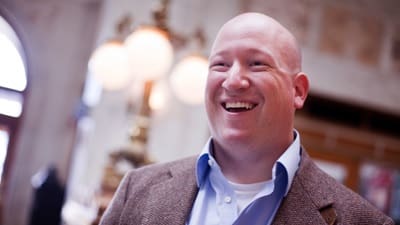
Greg Walsh, associate professor in the Division of Science, Information Arts and Technologies in The University of Baltimore’s Yale Gordon College of Arts and Sciences, has been named the University’s Parsons Professor of Digital Innovation. In this role, Prof. Walsh will expand his vision for UBalt’s Center for Digital Communication, Commerce, and Culture, evolving it into what he calls its “third phase” as a resource for students, researchers and educators to connect with community organizations working on important issues that have disproportionately affected Baltimore. Those issues range from effective learning and access to transportation, to business opportunities that, according to Prof. Walsh, have potential to improve life in the city.
Prof. Walsh says the Center will focus on the University’s place within the city and how that place can be woven into research, education, and service, with the local community as a steady partner.
“Our Center will become an overarching entity that makes connections with city-based non-profits and small businesses to technology- and design-focused classes within the University,” he says. “In this way, project-based classes can partner with these groups to create digital solutions that drive equity and inclusion while providing students with real-world experience for their resumes.”
According to a 2020 report by the Abell Foundation, only six out of 10 homes in Baltimore have wired internet-10 points below the national average. This statistic shows up disproportionally in African American and Hispanic households. Lower-income city residents rely on smartphones for their connectivity more than the national average, which puts them at a disadvantage for some government interactions that are not optimized for mobile.
“My plan for the Center is to connect classes with community groups, non-profits, and government so each can benefit: the students get experience working with real clients, and the groups get great solutions that focus on them as users,” Prof. Walsh says. “By honing in on the person at the other end of the digital pipeline, we can try to bridge some of those gaps. For example, we can make sure our proposed solutions focus on mobile- and library-friendly designs to make this work for everyone in Baltimore.”
On the commerce front, Prof. Walsh says the Center seeks to enhance the city’s potential as a home for many new businesses that are in need of tech-savvy employees.
“From a technology/business perspective, Baltimore has the potential to be one of the best cities on the East coast,” he says. “We have shipping access, railways, highways, and proximity to Washington and Philadelphia. Our location makes us ideal for large, digitally savvy corporations to locate here. Baltimore’s amenities are amplified by a digital workforce with experience in design, business, government, and education. I’m most excited about our Center supporting the city as it moves toward becoming a destination for some really smart companies.”
Walsh’s appointment was announced by UBalt President Kurt L. Schmoke, who noted in a message to the University community that “in this case, ‘digital’ refers to more than getting your work done through the magic of a touch screen. It’s bringing technology to bear on some difficult problems-things that hamper local people’s lives, young and old. This is our collective vision: a University of Baltimore that embraces community for miles around. We share our knowledge—we don’t keep it locked up behind our doors. Let’s cheer on Prof. Walsh as he joins those of us who are out there, making Baltimore everything its people believe it can be.”
Learn more about The University of Baltimore’s Center for Digital Communication, Commerce and Culture.









